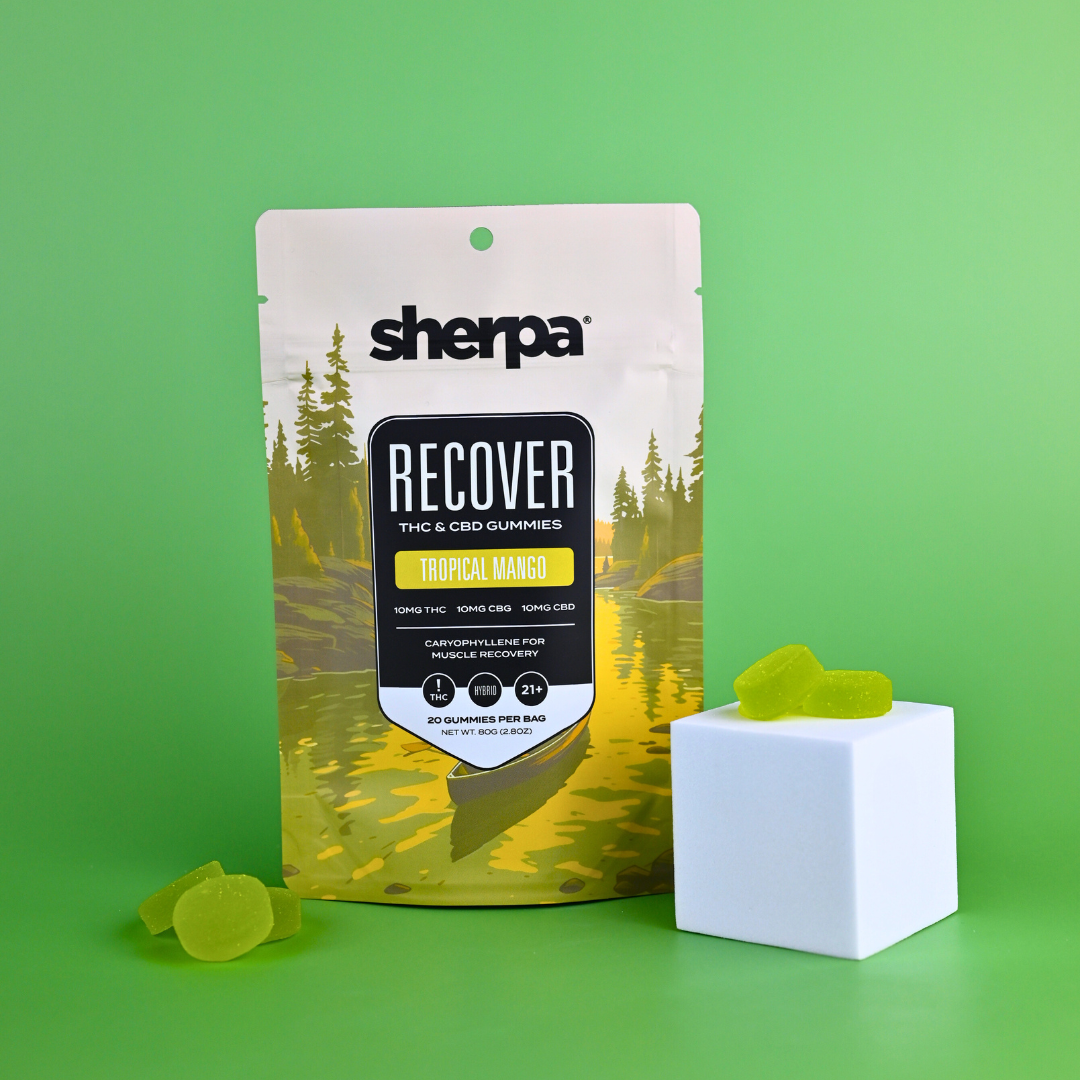
Our Blog
Autism and Edibles
Autism and Edibles
At the intersection of cannabis and health outcomes, one of the most intriguing areas of discussion is how cannabis might help manage the symptoms of autism.
As you know, cannabis use in medical treatments has become more mainstream in recent years, with research and anecdotal reports suggesting that cannabis — especially in edible form — may offer benefits for people with autism spectrum disorder, or ASD for short. But is there real science behind this? And can cannabis edibles be part of the solution for managing symptoms like anxiety, sensory overload, or communication difficulties?
We're going to answer all of these questions, but first let's get our arms around ADS and everything that comes with it.
Understanding Autism Spectrum Disorder
Before exploring how cannabis can help with the symptoms of ASD, it's important to understand what this disorder is and the variety of symptoms people with autism may experience.
ASD is a neurodevelopmental disorder that affects how a person thinks, interacts, and experiences the world. It's a spectrum, meaning that no two people with autism have the same experience. Symptoms can range from mild to severe and might include:
- Social Communication and Interaction Challenges: Difficulties in understanding social cues, making eye contact, or holding conversations.
- Repetitive Behaviors: Engaging in repetitive actions or rituals, such as hand-flapping, rocking, or insistence on sameness.
- Sensory Sensitivities: Heightened sensitivity to sounds, lights, textures, or other sensory inputs, which can lead to overwhelming feelings.
- Cognitive and Learning Differences: Some people with autism may have intellectual disabilities, while others may have average or above-average intelligence. Many have specific learning strengths or weaknesses.
While there is no "one-size-fits-all" treatment for autism, many people with ASD and their families look for ways to help manage symptoms, improve quality of life, and promote independence. Conventional treatments often include behavioral therapy, speech therapy, and, in some cases, medication to address symptoms like anxiety, sleep problems, and irritability. These often come with adverse side effects though, many of which might be worse than the symptoms they were looking to treat.
That's why a lot of families are turning to alternative treatments like cannabis as a potential therapeutic option, and edibles, in particular, are gaining attention for their unique benefits.
The Rise of Cannabis as a Therapeutic Option for ASD
People have been using cannabis for its medicinal properties for millennia, especially in treating pain, inflammation, and malaise. In recent years, though, cannabis has also shown promise in addressing a variety of neurological conditions, including epilepsy, multiple sclerosis, and Parkinson's disease. Some studies and anecdotal evidence have suggested that cannabis may also help people with autism by addressing some of the common co-occurring symptoms like anxiety, aggression, sensory overload, and sleep disturbances.
The two main compounds in cannabis that are of interest when it comes to autism are tetrahydrocannabinol and cannabidiol, or THC and CBD respectively. THC is the psychoactive component that produces the classic "high," while CBD is non-psychoactive and is known for its calming, anti-inflammatory, and anxiolytic — or anxiety-reducing — properties.
For those with autism, the potential benefits of cannabis — whether through CBD, THC, or a combination of both — may include:
- Reducing Anxiety: Many people with autism experience heightened anxiety, which can manifest as agitation, irritability, and social withdrawal. Cannabis, particularly CBD, has been studied for its ability to reduce anxiety and promote relaxation.
- Alleviating Aggression and Hyperactivity: Aggression and hyperactivity are common symptoms in people with autism. Some evidence suggests that cannabis may help reduce impulsive or aggressive behaviors, making it easier to manage social interactions and other challenges.
- Improving Sleep: Sleep disturbances are widespread among people with autism, with many people struggling to fall or stay asleep. Cannabis has been shown to improve sleep quality in both children and adults, particularly when CBD is involved.
- Managing Sensory Overload: People with autism can be sensitive to sensory inputs like bright lights, loud noises, or even textures. Cannabis may help reduce sensory sensitivities and ease the discomfort associated with sensory overload.
While the potential benefits are promising, it's important to note that cannabis use for autism treatment is still a relatively new area of study, and much of the evidence is either anecdotal or based on small-scale studies. The FDA has not approved cannabis specifically for the treatment of autism, though research is ongoing.
Also — grain of salt — we are not doctors and do not suggest using any of our products medicinally unless explicitly approved by a healthcare provider. We know you're probably looking for alternative avenues for relief, but you need to make sure that cannabis is not going to interact negatively with any other medications you or your loved one might be taking.
That said, there are a few reasons why you should ask your doctor if cannabis edibles might help.
Why Should You Try Edibles for Autism?
When considering cannabis for autism, edibles have some distinct advantages over other methods of consumption, such as smoking or vaping. Here's why edibles might be an appealing option:
Longer-Lasting Effects
One of the primary benefits of cannabis edibles is that they tend to provide longer-lasting effects compared to smoking or vaping. While the onset of effects from edibles can take anywhere from 30 minutes to two hours depending on the person, the effects can last anywhere from four to eight hours. This can be particularly useful for people with autism who experience symptoms like anxiety or sleep disturbances throughout the day or night. By consuming an edible, they can enjoy a sustained effect that helps to manage these symptoms over a longer period.
Easy to Dose
Cannabis edibles are also a quick and easy way to consume cannabis, especially when compared to smoking or vaping. For people with autism who may already have sensory sensitivities, the smell and smoke of traditional cannabis consumption methods can be difficult or even overwhelming. Edibles like gummies, chocolates, or capsules offer a much more palatable alternative.
Another benefit is that edibles come in pre-measured doses, which makes it easier to control and monitor THC and CBD intake. For someone who is new to cannabis or is concerned about potential overconsumption, edibles allow for precision. If you're looking to start slow — which you should — we have 2mg Microdosing Pills that are the perfect way to try out cannabis and see if it improves anything.
Reduced Risk of Lung Irritation
Unlike smoking or vaping, consuming edibles doesn't involve inhaling smoke or vapor, which can irritate the lungs and airways. For people with autism who may have respiratory sensitivities or asthma, edibles are a much safer alternative. This also makes edibles a much better option for children or people who might have difficulty with inhalation-based cannabis methods.
Variety of Options
Cannabis edibles come in a wide variety of forms and flavors, from gummies, chocolates and even beverages. This diversity allows people to choose a product that suits their preferences, which is particularly useful for picky eaters or those with dietary restrictions. Some edibles are also made with organic or allergen-free ingredients, which can be helpful for people with specific sensitivities.
Potential Benefits of Cannabis Edibles for Autism
While research is still limited, there is growing evidence that cannabis edibles can help manage various symptoms of autism. We'll go through those now.
Calming Effects for Anxiety
Anxiety is one of the most common co-occurring conditions in people with autism. It can manifest in different ways, including excessive worry, social withdrawal, or irritability. CBD, in particular, has been shown to have calming effects, helping to relax the nervous system without causing a high. THC, when used in lower doses or combined with CBD, may also contribute to a more relaxed state, which could be beneficial for people who struggle with daily anxiety.
Improved Social Interaction
Some people with autism experience difficulty in social situations, often due to anxiety or an inability to process social cues. Cannabis has been reported to help some people feel more comfortable and less socially inhibited, potentially allowing them to engage in social interactions with greater ease. Again, these effects are more likely when using a balanced CBD-to-THC edible, as CBD helps mitigate the potentially disorienting effects of THC. If you're looking to help improve social interactions, consider a 1:1 ratio to start out with.
Reduced Aggression and Behavioral Issues
Aggressive or impulsive behaviors are common in people with autism, and these can make social interactions challenging. There is anecdotal evidence suggesting that cannabis may help reduce aggression, impulsivity, and hyperactivity by calming the central nervous system and promoting relaxation. Some studies have also shown that CBD specifically may have a mood-stabilizing effect, which could help reduce irritability and outbursts.
Better Sleep
Sleep disturbances are also a common issue for people with autism, often due to anxiety, sensory overload, or difficulties with self-regulation. Cannabis, especially CBD, has shown promise in helping to improve sleep quality by promoting relaxation and reducing anxiety. THC may also help people fall asleep more easily, though it's important to find the right dosage, as high doses of THC can sometimes have the opposite effect, causing restlessness or vivid dreams.
Relief from Sensory Overload
Many people with autism are hypersensitive to sensory stimuli, such as bright lights, loud noises, or certain textures. This sensory overload can be overwhelming, leading to anxiety or even meltdowns. Cannabis, particularly CBD, can help regulate the sensory processing system, making it easier for people with autism to tolerate and manage overwhelming sensory inputs.
So now that you've got a handle on the benefits let's balance that out with the other side of the coin and talk about the potential drawbacks.
Risks and Considerations
While cannabis edibles offer a variety of potential benefits, there are some risks and considerations to keep in mind.
Lack of Research
As of now, there is limited clinical research on the use of cannabis to treat autism, and much of the evidence is anecdotal. While some parents and caregivers report positive results, more studies are needed to really understand the long-term effects and efficacy of cannabis for autism.
Dosing Challenges
Finding the right dosage of cannabis, especially when using edibles, can be challenging. Edibles can take time to kick in, and the effects can vary from person to person. Starting with a very low dose and gradually increasing is key to avoiding adverse effects like excessive sedation or increased anxiety.
Legal and Regulatory Considerations
Cannabis use is still illegal in some places, and laws regarding its use for medical conditions like autism vary by location. It's important to understand the legal status of cannabis in your area and consult with a healthcare provider before beginning any cannabis-based treatment. The good news is that all of Sherpa's products are federally legal under the 2018 Farm Bill, meaning you won't run into any issues, no matter where you live in the U.S.
Side Effects
Cannabis can have side effects, especially when used in higher doses. These may include dizziness, dry mouth, nausea, or a sense of confusion and disorientation. For people with autism who may already struggle with sensory sensitivities, even mild side effects can be overwhelming. Use extreme caution if you're planning on giving cannabis to someone in your care, and always consult with a medical professional before introducing anything new into their routine.
Final Thoughts: The Synergies of Cannabis and Autism
Cannabis, particularly in edible form, has shown promise as a potential tool for managing some of the symptoms associated with autism spectrum disorder. While more research is needed to fully understand its efficacy and safety, the preliminary evidence and anecdotal reports are encouraging.
That said, cannabis should never be considered a cure-all, and it's important to approach its use cautiously and under the guidance of a healthcare provider. As always, people with autism and their caregivers should stay informed and make choices that align with their unique needs and circumstances.
We here at Sherpa wish you nothing but the best in your journey, and we hope that our products can help you or your loved one find the relief you're looking for. Let us know if we can help.




